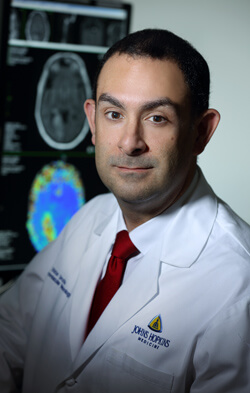
NeuroLogic
November 18, 2013

Since 2005 and 2004, respectively, The Johns Hopkins Hospital and Johns Hopkins Bayview Medical Center have been certified by the Joint Commission as primary stroke centers, a designation that means these hospitals follow the best practices for stroke care developed by the American Heart Association/American Stroke Association. “Being certified as a comprehensive stroke center takes it to a higher level,” says The Johns Hopkins Hospital Stroke Center director,Victor Urrutia.
Urrutia explains that The Johns Hopkins Hospital has long been a leader in stroke care and neurology in general, placing top in the country for neurology and neurosurgery in this year’s U.S. News & World Report hospital rankings. “We have all the elements, resources and equipment that allow us to take care of stroke patients with the newest and best technology and medicines, all factors that helped us gain the primary stroke center certification,” he says.
But becoming a comprehensive stroke center requires a level of care that few hospitals are able to deliver, including annual experience treating a set volume of patients with the most complicated kinds of strokes, the ability to perform medical imaging including MRIs around the clock every day, and the ability to deliver physical, occupational and speech therapy most days of the week. It also requires that hospitals move patients smoothly from the hospital to outpatient care and provide community education, reaching out to local residents to teach them about preventing and recognizing strokes.
Additionally and importantly, Urrutia adds, the certification requires hospitals to track their performance—the outcomes of their stroke patients and their complication rates. Recording these data can be a powerful tool in helping Johns Hopkins and other hospitals with a comprehensive stroke center certification continue improving care, especially for the most complicated cases.
“Understanding the data allows us to detect a trend,” Urrutia explains. Consequently, by looking back at outcomes, both good and bad, he and other stroke neurologists at Johns Hopkins can know what to do more of, as well as what they can do differently. “This infrastructure gives us a process for quality improvement, a way to maximize safety and patient outcomes,” he says.
Having such a comprehensive set of tools for helping stroke patients makes The Johns Hopkins Hospital one of the most qualified hospitals in the country and the only hospital in Maryland for treating the most difficult stroke patients, he adds.
“When it comes to improving patients’ lives and safety and outcomes, discovering new ways to make a hospital work can be just as powerful as discovering a new medication,” Urrutia says. “That’s why this certification is so important.”
Information: 410-955-2228

